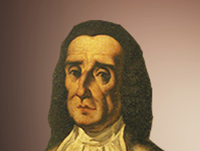From the discovery of gluten to studies on phosphors; from investigations into the electrophysical properties of amber to an accurate physiological description of the human body: in provincial Bologna, Jacopo Bartolomeo Beccari represented the enlightened European man, capable of connecting various disciplines together. With a number of colleagues, he brought together the Istituto delle Scienze and the Archiginnasio. The professor was the first in Italy to elevate the subject of Chemistry to a university discipline, despite the backwardness of the Università di Bologna at that time.
 Jacopo Bartolomeo Beccari was born in Bologna to a family of humble means. His father Romeo was an apothecary who, despite his difficulties, succeeded in educating his son by entrusting him to illustrious names from the University of Bologna.
Jacopo Bartolomeo Beccari was born in Bologna to a family of humble means. His father Romeo was an apothecary who, despite his difficulties, succeeded in educating his son by entrusting him to illustrious names from the University of Bologna.
After attending the Jesuit College, Jacopo’s education was taken over by Canon Giovan Battista Trionfetti, who taught him Philosophy and experimental Physics, while Jacopo Sandri, a pupil of Marcello Malpighi, took charge of his medical training.
In 1704, Beccari graduated in Medicine and Philosophy, continuing his own research, experiments and autopsy practices, the latter while assisting Giovanni Battista Morgagni in the Hospital of Santa Maria della Morte, adjacent to the Archiginnasio.
Although he had not yet dedicated himself to the medical profession, after a brief interlude as a lecturer in Logic (1709), in 1712 he was assigned the professorship of Theoretical Medicine, later replaced by that of Practical Medicine.
In the meantime, in 1711, the Institute’s new scientific and artistic centre had been established in the city, and would open its doors in 1714, after the old Palazzo Poggi had been modernised. In the Institute, promoted by Luigi Ferdinando Marsili, Beccari played a leading role, initially as a lecturer in Experimental Physics (1711), later as a professor of Chemistry (1734), and even holding managerial positions. Indeed, he repeatedly served as its President, in 1724, 1735, 1740 and then from 1750 until his death.
The Institute made it possible to approach the experiments being conducted in Europe, something that was impossible at the Archiginnasio given the severity of the ecclesiastical directives that prevailed there, and the lack of attention paid by the university directors, who were often linked to the city’s aristocracy.
This is what Beccari wrote about the local authorities: “Here every step is taken to be an insult to the Principality, and this great jealousy of the honour of the Principality ruins this poor University, which can only subsist in the pure will of outsiders lured with caresses and not frozen with fear”.
Minds like his were fortunately able to make use of the Institute's many workshops, as well as the great ecclesiastical support of the Bolognese Prospero Lambertini who, first as archbishop (1730-1740) and then as pontiff (1740-1758), spared no donations or impositions to increase Marsili’s academies. Such was the pontiff's direct esteem for Beccari, that he was reluctant to choose another chief physician after Jacopo resigned.
Right from the start, Beccari was able to make use of the sophisticated instrumentation of the Accademia delle Scienze (although he often used rudimentary apparatuses of his own design), with which he was able to make discoveries in various fields: for example, he was the first to use the microscope to carry out a complete study, accompanied by an essay on mechanical analysis (De Bononiensi arena quondam), of the yellow sand found in the area of Bologna (1711).
From the point of view of teaching, it is known that he had a slight stutter and therefore did not particularly shine in this area, but certainly the topics he dealt with were up-to-date and stimulating, so much so that his medical lectures were collected in the five volumes of Institutionum Medicinalium in quinque libros divisarum Prolegomena and published in 1759. His Consulta (Medical consultations), instead, came out – without his authorisation – after his death, between 1776 and 1781, leaving evidence of Beccari's skills, especially in the field of diagnostics.
What brought him international fame and membership in the Royal Society of London, however, was the discovery of gluten, communicated in De frumento to the Accademia delle Scienze in 1728 (though it was not published until 1745). Due to this chemical investigation of wheat, he is still regarded today as a forerunner of food science and bromatological chemistry. Using intuitive procedures, Beccari realised that the protein component of wheat has similar characteristics to those previously thought to be solely of animal origin (more in-depth chemical studies would only be carried out from the early 1800s).
He is also credited with bringing Chemistry into the university curriculum. Indeed, Beccari was the first professor in Italy to hold the professorship in 1737: one that attracted students from all over Europe, which was unusual for the University of Bologna.
As was the custom at the time, the professor also had his own workshop at home (Via San Petronio Vecchio, 8), where he gave some lessons.
His long career as a professor ended in 1749, but he did not leave the scientific circles, and his research and experiments progressed. At the end of his life (Beccari died in 1766), these left their mark on a rich array of disciplines, some of which had only just been created: physiology, pathology, dietetics, bromatology, hydrology, meteorology, hygiene, optics, botany and electrophysics. In this regard, Beccari may justly be regarded as an enlightened scientist, aware of the need to create relationships between various subjects from a new perspective aimed at experimental and speculative progress.
